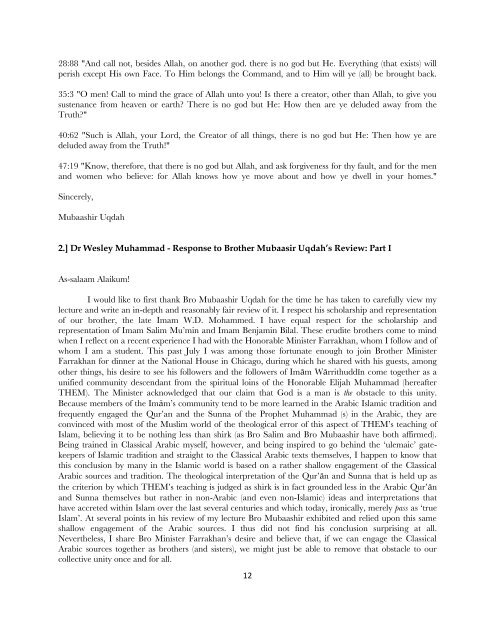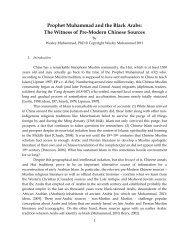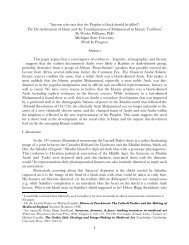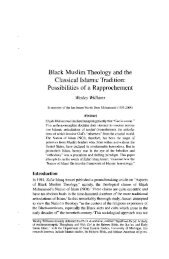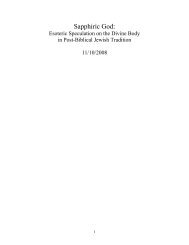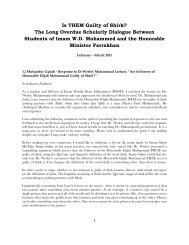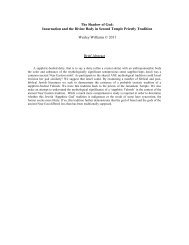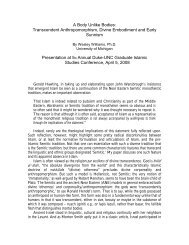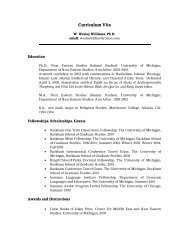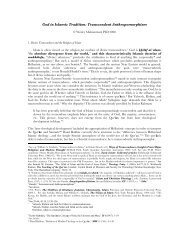Is THEM Guilty of Shirk? - Dr. Wesley Muhammad
Is THEM Guilty of Shirk? - Dr. Wesley Muhammad
Is THEM Guilty of Shirk? - Dr. Wesley Muhammad
Create successful ePaper yourself
Turn your PDF publications into a flip-book with our unique Google optimized e-Paper software.
28:88 "And call not, besides Allah, on another god. there is no god but He. Everything (that exists) will<br />
perish except His own Face. To Him belongs the Command, and to Him will ye (all) be brought back.<br />
35:3 "O men! Call to mind the grace <strong>of</strong> Allah unto you! <strong>Is</strong> there a creator, other than Allah, to give you<br />
sustenance from heaven or earth? There is no god but He: How then are ye deluded away from the<br />
Truth?"<br />
40:62 "Such is Allah, your Lord, the Creator <strong>of</strong> all things, there is no god but He: Then how ye are<br />
deluded away from the Truth!"<br />
47:19 "Know, therefore, that there is no god but Allah, and ask forgiveness for thy fault, and for the men<br />
and women who believe: for Allah knows how ye move about and how ye dwell in your homes."<br />
Sincerely,<br />
Mubaashir Uqdah<br />
2.] <strong>Dr</strong> <strong>Wesley</strong> <strong>Muhammad</strong> - Response to Brother Mubaasir Uqdah‟s Review: Part I<br />
As-salaam Alaikum!<br />
I would like to first thank Bro Mubaashir Uqdah for the time he has taken to carefully view my<br />
lecture and write an in-depth and reasonably fair review <strong>of</strong> it. I respect his scholarship and representation<br />
<strong>of</strong> our brother, the late Imam W.D. Mohammed. I have equal respect for the scholarship and<br />
representation <strong>of</strong> Imam Salim Mu‘min and Imam Benjamin Bilal. These erudite brothers come to mind<br />
when I reflect on a recent experience I had with the Honorable Minister Farrakhan, whom I follow and <strong>of</strong><br />
whom I am a student. This past July I was among those fortunate enough to join Brother Minister<br />
Farrakhan for dinner at the National House in Chicago, during which he shared with his guests, among<br />
other things, his desire to see his followers and the followers <strong>of</strong> Imām Wārrithuddīn come together as a<br />
unified community descendant from the spiritual loins <strong>of</strong> the Honorable Elijah <strong>Muhammad</strong> (hereafter<br />
<strong>THEM</strong>). The Minister acknowledged that our claim that God is a man is the obstacle to this unity.<br />
Because members <strong>of</strong> the Imām‘s community tend to be more learned in the Arabic <strong>Is</strong>lamic tradition and<br />
frequently engaged the Qur‘an and the Sunna <strong>of</strong> the Prophet <strong>Muhammad</strong> (s) in the Arabic, they are<br />
convinced with most <strong>of</strong> the Muslim world <strong>of</strong> the theological error <strong>of</strong> this aspect <strong>of</strong> <strong>THEM</strong>‘s teaching <strong>of</strong><br />
<strong>Is</strong>lam, believing it to be nothing less than shirk (as Bro Salim and Bro Mubaashir have both affirmed).<br />
Being trained in Classical Arabic myself, however, and being inspired to go behind the ‗ulemaic‘ gatekeepers<br />
<strong>of</strong> <strong>Is</strong>lamic tradition and straight to the Classical Arabic texts themselves, I happen to know that<br />
this conclusion by many in the <strong>Is</strong>lamic world is based on a rather shallow engagement <strong>of</strong> the Classical<br />
Arabic sources and tradition. The theological interpretation <strong>of</strong> the Qur‘ān and Sunna that is held up as<br />
the criterion by which <strong>THEM</strong>‘s teaching is judged as shirk is in fact grounded less in the Arabic Qur‘ān<br />
and Sunna themselves but rather in non-Arabic (and even non-<strong>Is</strong>lamic) ideas and interpretations that<br />
have accreted within <strong>Is</strong>lam over the last several centuries and which today, ironically, merely pass as ‗true<br />
<strong>Is</strong>lam‘. At several points in his review <strong>of</strong> my lecture Bro Mubaashir exhibited and relied upon this same<br />
shallow engagement <strong>of</strong> the Arabic sources. I thus did not find his conclusion surprising at all.<br />
Nevertheless, I share Bro Minister Farrakhan‘s desire and believe that, if we can engage the Classical<br />
Arabic sources together as brothers (and sisters), we might just be able to remove that obstacle to our<br />
collective unity once and for all.<br />
12


